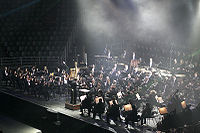
Music appreciation is a division of musicology that is designed to teach students how to understand and describe the contexts and creative processes involved in music composition.
The concept of music appreciation is often taught as a subset of music theory in higher education and focuses predominantly on Western art music, commonly called "Classical music". This study of music is classified in a number of ways, including (but not limited to) examining music literacy and core musical elements such as pitch, duration, structure, texture and expressive techniques. It explores the aesthetic theories associated with the listening experience in addition to an explorative history of music.[1]
Music appreciation classes also typically include information about the composers, the instruments and ensembles, and the different styles of music from an era. Courses revolving around this material are often designed for non-music tertiary students. Students learn how to listen and respond to recordings or live performances of musical pieces or excerpts from pieces such as symphonies, opera arias and concertos.
"Appreciation," in this context, means the understanding of the value and merit of different styles of music. The term “appreciation” has roots in philosophy, where it is described in a musical sense as a “kind of formal analogue of emotional experience”.[2] It can be associated with musical criticism, and is used to describe the positive and negative responses of a given musical work from a scholarly perspective.[3]
- ^ Wilson, Paul; Kivy, Peter (1982). "The Corded Shell: Reflections on Musical Expression". Journal of Music Theory. 26 (1): 166. doi:10.2307/843359. JSTOR 843359. Retrieved April 12, 2021.
- ^ Garvin, Lucius; Langer, Susanne K. (June 1944). "Philosophy in a New Key. A Study in the Symbolism of Reason, Rite, and Art". Philosophy and Phenomenological Research. 4 (4): 565. doi:10.2307/2103043. JSTOR 2103043.
- ^ Barrett, Margaret S. (2007), "Music Appreciation: Exploring Similarity and Difference", International Handbook of Research in Arts Education, Springer International Handbook of Research in Arts Education, vol. 16, Dordrecht: Springer Netherlands, pp. 605–622, doi:10.1007/978-1-4020-3052-9_39, ISBN 978-1-4020-2998-1, retrieved 2021-06-04
